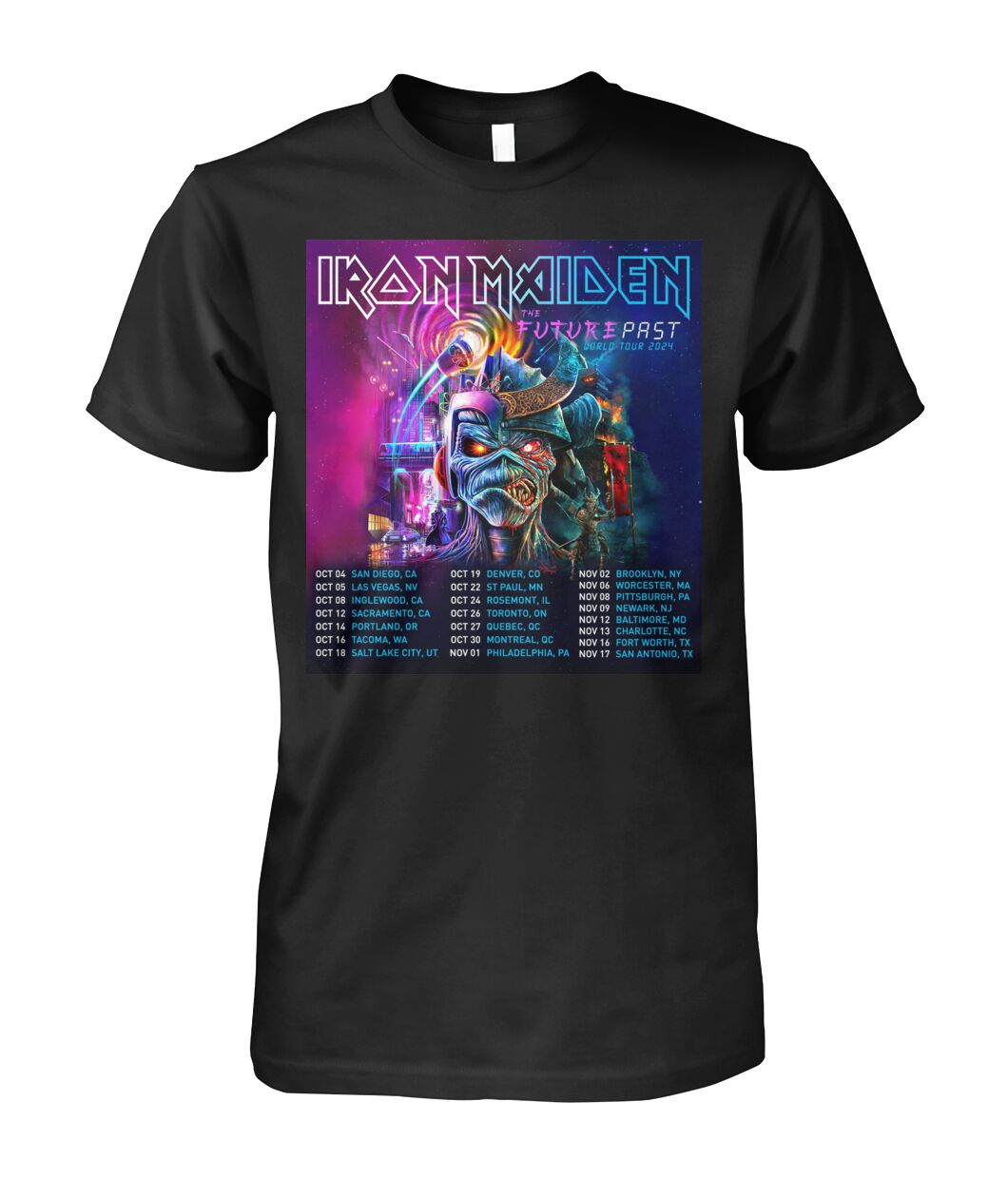Music
Will Iron Maiden Tour the US Again?
As the anticipation for live music continues to soar, fans of iconic rock band Iron Maiden can breathe a sigh of relief. The legendary group is set to return to North America with their much-anticipated The Future Past Tour in 2024. This announcement not only excites long-time followers but also raises intriguing questions about the cultural significance and impact of such tours in today’s music landscape. As we delve into the details surrounding this monumental event, we’ll explore its implications on music culture, local economies, and fan communities.
The Exciting Details of The Future Past Tour

Iron Maiden’s The Future Past Tour promises an exhilarating lineup of performances across various cities in the United States and Canada from October 2024 onward. Kicking off the tour on October 4, 2024, in San Diego, CA, and culminating in Philadelphia on November 1, 2024, the schedule showcases a robust series of concerts that will undoubtedly attract a diverse audience. This significant moment for fans who may have felt deprived of live music experiences in recent years due to global disruptions is worth exploring in detail.
Understanding the Tour Schedule

The future promises an extensive array of shows that span several cities, each selected carefully to ensure that fans from different backgrounds and demographics have an opportunity to experience the magic of Iron Maiden live.
With stops in vibrant urban centers like Los Angeles, Chicago, and New York City, the tour aims to cater to a wide range of audiences.
Such strategic planning speaks volumes about the band’s commitment to re-engaging with their fan base and revitalizing the essence of live performance. This tour is set against the backdrop of a world eager to embrace the joy of communal gatherings once again.
A Return to Live Performance
After years of uncertainty and isolation induced by global events, the mere idea of live music seems almost ethereal. For many fans, Iron Maiden’s concerts represent a rite of passage—a communal experience steeped in nostalgia and electrifying atmosphere.
These concerts are more than just entertainment; they forge deep connections among attendees, creating unforgettable memories that bind them together.
The anticipation builds not just around the music but also around the shared experience of being part of something larger than oneself—a celebration of life through rock ‘n’ roll.
The Cultural Importance of Touring Bands
Iron Maiden’s return to the U.S. isn’t merely a concert tour; it symbolizes a resurgence in the live music scene. In a time when digital platforms dominate our music consumption, attending live performances remains irreplaceable.
When iconic bands like Iron Maiden hit the road, they revive a cultural phenomenon that has shaped generational identities.
Their concerts are akin to modern-day festivals where people come together to celebrate music, express themselves, and revel in the energy that only live performances can provide.
The Impact on Local Economies

The impending tour serves as a reminder of the economic power of live music events. Beyond entertaining fans, concerts create jobs, stimulate tourism, and foster community spirit—elements that help heal the economic wounds inflicted by years of uncertainty.
Job Creation Through Concerts
Local venues, staffing agencies, food vendors, and transportation services all stand to benefit from the influx of concert-goers.
For instance, security personnel are hired to ensure safety, technicians set up gear, and hospitality staff cater to hungry fans.
This ripple effect extends to restaurants, hotels, and shops near concert venues, igniting a spark of economic activity that is often desperately needed in post-pandemic recovery efforts.
Reviving Tourism
Cities hosting Iron Maiden’s shows can expect an uptick in tourism that goes beyond the concert itself.
Fans traveling from out of town would likely extend their stays, exploring local attractions, dining at neighborhood eateries, and engaging with the community.
This engagement not only supports local businesses but also enriches the cultural fabric of the host city. By welcoming fans from various regions, these cities enhance their reputation as vibrant hubs for live entertainment.
Community Building and Spirit
Concerts are more than just financial transactions; they are communal experiences that unify diverse groups of people through a shared love of music.
In a world increasingly divided by differences, Iron Maiden’s tour has the potential to bridge gaps, bringing together fans of various ages, ethnicities, and backgrounds who come together for a singular purpose—to enjoy the music that has shaped their lives.
This sense of community fosters a welcoming environment where friendships can bloom, stories can be shared, and a collective spirit can thrive.
Fan Perspectives and Community Engagement

In the lead-up to Iron Maiden’s tour, online forums are buzzing with discussions about setlists, potential surprise guests, and how the tour will be structured.
This heightened engagement within the fan community illustrates the deep-seated emotional investment fans have in the band and their performances.
The Emotional Connection with the Band
For many fans, Iron Maiden represents more than just music; they symbolize a connection to youth, rebellion, and camaraderie.
The excitement surrounding the upcoming tour amplifies nostalgic feelings and reignites memories of past concerts.
Fans often share personal anecdotes of how Iron Maiden’s music impacted their lives, forging connections over shared experiences that transcend geographical boundaries.
Speculation and Anticipation
As ticket sales approach, fans find themselves in a frenzied state of preparation, speculating on every detail of the tour.
Discussions on platforms like Reddit reflect an eager anticipation that transforms the concert into an event worthy of meticulous planning.
From coordinating travel arrangements to strategizing the best way to secure tickets, the excitement permeates the fan community, evolving from mere enthusiasm into a collective movement.
The Shared Experience of Live Music
Ultimately, securing a ticket to see Iron Maiden perform live is not just a transactional purchase; it becomes an affirmation of loyalty to the band and heavy metal music as a genre.
Fans are not just buying access to a show; they are investing in a shared experience that transcends time, solidifying their place in a legacy defined by incredible music and powerful performances.
The Broader Implications of the Tour

Looking beyond the immediate excitement generated by Iron Maiden’s tour, important questions arise regarding the future of live music.
As bands vie for attention in an increasingly digital age filled with streaming options, the physical experience of attending a concert remains irreplaceable.
The Evolution of Concert Experiences
Iron Maiden’s tour serves as a benchmark for how classic rock bands navigate the modern musical landscape, potentially influencing other acts in their approach to touring and fan engagement.
More than ever, artists recognize the need to create memorable experiences that resonate with fans on a deeper level.
This evolution may encourage bands to rethink their performances, incorporating elements such as interactive experiences, multimedia presentations, and unique set designs to captivate audiences.
Navigating the Digital Age
While the internet has made music more accessible, it cannot replicate the thrill of experiencing a concert live.
Iron Maiden’s tour stands as a testament to the enduring desire for authentic experiences, encouraging fans to engage with music in ways that streaming services cannot fulfill.
By participating in live performances, fans become part of an electric atmosphere that fosters connection and creates lasting memories—all of which contribute to the lasting legacy of music.
Influencing Future Tours and Fan Dynamics
Finally, the anticipated success of Iron Maiden’s tour could serve as a catalyst for other bands to follow suit, showcasing the resilience of the live music industry.
As the world begins to recover from recent challenges, musicians may realize the importance of reconnecting with their audiences, leading to a renewed focus on community engagement and meaningful interactions between artists and fans.
Iron Maiden’s impending tour through the U.S. stands as a beacon of hope for music enthusiasts everywhere. It signifies not just a reunion of fans and artists but a broader rekindling of the spirit of live performance that has defined rock ‘n’ roll for decades.
Through their concerts, Iron Maiden is reviving not only their own legacy but also contributing to the revival of the entire live music scene. As fans prepare for what promises to be a monumental event in rock history, one thing remains clear: the anticipation surrounding Iron Maiden’s return is about more than music; it’s a collective celebration of community, resilience, and the undying spirit of rock ‘n’ roll.
